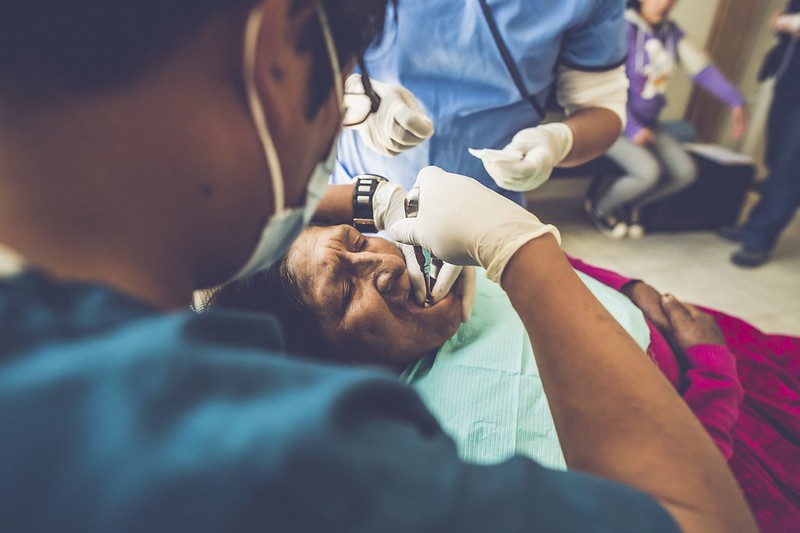By word (and care) of mouth
By Tianna Haas | Peru in South America

Photos by Sean Sheridan.
Brendan, a linguist by trade, and Erin, a dentist, each address needs in the Abancay area of Peru, but often, their forms of ministry intertwine.
Brendan’s language ministry
The Abancay area is home to a particular strain of Quechua: East Apurimac Quechua. Brendan works to translate faith-based materials into written and audio versions in places with various levels of literacy.
While the region is labelled “Christian” due to the influence of colonizing Spaniards’ Catholicism, the Peruvians have not had the privilege of learning scripture in their primary language. Brendan’s work with SIM’s ministries in Abancay brings the Word of God near to the people of the Apurimac, just as Jesus drew near to humanity in a body of flesh.

Brendan leads the oral Bible storying section of the ministry, which focuses on pairing the audio Bible with pictures and instruction. The storytelling techniques help people retain stories from the Word of God and pass them on to their neighbours and friends.
The oral Bible storying programme has allowed many new Jesus followers to strengthen their faith and minister to others. Resources such as picture books and solar-powered audio devices have become indispensable tools to Quechua speakers furthering the kingdom of God.

Maria Teresa
Making the message of Jesus accessible to a predominantly oral community has revolutionised many lives. Maria Teresa’s story shows that this missional approach can reshape hearts, families and communities.

Maria Teresa grew up in the Andes where terrorism was pervasive. In her teenage years, she fled her home, Ccafiamarca. Despite her bold escape, she drifted back to her village after 3 years, where she met and married a man named Abel.
The violence that had driven Maria Teresa away from her home village was soon present in the home she and Abel created together. He had begun to drink heavily and beat her.
Abuse of alcohol is a prevalent problem in rural Peruvian villages, so much so that the Connallys published a Quechua book in 2011 to counsel believers through the temptation of alcoholism.
Shortly after the abuse began, Maria Teresa followed suit and leaned on alcohol as a coping mechanism. This also prompted her to fight back against Abel’s violence.
Maria Teresa’s excelled in self-defence to the point that she started teaching other women to fend off their own husbands’ attacks.
Brendan said: “As you can imagine a town full of husbands and wives beating each other was not a pleasant environment for anyone, especially children.”
Brendan’s colleague Cecilio first encountered Maria Teresa through her children. They attended a church-based programme that presented Bible storying from the Abancay ministries.
Cecilio encouraged her children to bring their mother along for the next church service, despite some reservations he had.
“At this point, Maria Teresa had a reputation for beating up men, and Cecilio was worried she might come after him!” said Brendan.
Cecilio overcame his fear and visited Maria Teresa and her children outside of church. Contrary to the rumours he had heard, Maria Teresa was courteous as Cecilio explained the gospel.
Afterward, Maria Teresa told Cecilio: “I’ll consider Jesus and take some time to count the cost.”
A little over a year later, she committed her life to Christ. Over the next year, Abel saw the drastic change in his wife and chose to dedicate his life to the Lord.
Abel and Maria Teresa’s family has begun to heal from the drinking and violence that filled their home. Now, the couple is involved in church planting, and they put the materials from the oral Bible project to good use.
Abel has become the pastor of Ccafiamarca’s church, and he preaches through oral Bible storying methods.

Maria Teresa supports church plants by travel. She treks to Cruzpata, which is two hours away, to share the audio Bible with this village. Few people in Cruzpata read or write in East Apurimac Quechua, so the resources Brendan developed with the oral Bible project are essential to Maria Teresa’s work.
The scope of oral Bible storying is wide, but Brendan’s day-to-day ministry happens in conjunction with Erin and her mobile dental clinics.
Erin’s dentistry and mobile clinics
As a dentist, Erin focuses on the physical health of Peruvians. She visits rural villages that don’t have dental services with a group of Peruvian volunteers and portable dental equipment. Yet the areas she and Brendan select for their circuit have a distinct purpose.
The mobile dental clinic does not impose their view of health on communities but lets villages extend the invitation of their own accord.

Erin receives invitations from hundreds of villages, but their time and abilities can only go so far.
As they determine the locations with the greatest needs, they consider both the spiritual and physical condition of the community.
As they determine the locations with the greatest needs, they consider both the spiritual and physical condition of the community.
According to AIDIA, 92 per cent of East Apurimac Quechua villages do not have a church. This alarming fact motivates the Connallys to shepherd young or struggling churches as they journey with the mobile clinic.
Although Erin and her team provide charitable dental work, they still place responsibility in the village’s hands to pay for fuel, meals, housing and a work space for the team. The village must also spread news about the clinic by word of mouth themselves.
Each patient ends up paying $1 for an appointment. The low costs let the patients contribute despite their financial situation.
The clinics last for one to two days, and return visits from the mobile clinic happen a few times a year for a period of 3 years. Their holistic care approach helps them continue to connect with the communities and support church plants beyond a one-time visit.

Many of Erin’s volunteer dental workers double as oral Bible storying volunteers with Brendan’s programme. Dina, one dental assistant and evangelist, recently paved the way for the dental clinic in Chacoche.
Dina began periodically hiking to Chacoche and telling Bible stories. Eventually, Peruvian Jesus followers from a nearby village joined her and started hosting weekly church services.
Now, with plans for a church building on the horizon, Dina and the other evangelists who have poured into this village have asked for the team to do dental outreach in Chacoche.
Erin said: “The believers wanted their neighbours to understand that they shouldn’t feel threatened by Christians, but that they were there to serve.”
Their team’s dental and evangelical work produce several angles for community care. The Apurimac region of Peru is being invigorated with life as believers mirror the ministry of Jesus that treated the body and the soul.
Support SIM’s Abancay ministries
The Connallys’ role in community development model branches out further than dental work and Bible storying. Fellow missionaries also travel to these same villages for other social projects like water treatment.
Will you come alongside the Connallys in prayer and with your resources? Find the donate button below and use the corresponding project IDs: 91152 for Hope Dental Clinic and 91151 for Oral Scripture Use Training.
Pray for:
• Maria’s work in Cruzpata and Abel’s ministry in Ccafiamarca.
• the dentistry services Erin provides. Pray God allows physical care to become a doorway to spiritual care.
• Brendan’s oral Bible storying and translation work.
• efforts to share scripture in Quechua.
Related stories

Uruguay immigrants are putting down New Roots Duplicate 1
Uruguay has a large immigrant population, and students from the vocational programme at the Biblical Seminary of Uruguay, a partner of SIM, realised many foreigners were finding it difficult to adjust to their new home. New Roots ministry was formed to assist these newcomers!

Uruguay immigrants are putting down New Roots
Uruguay has a large immigrant population, and students from the vocational programme at the Biblical Seminary of Uruguay, a partner of SIM, realised many foreigners were finding it difficult to adjust to their new home. New Roots ministry was formed to assist these newcomers!

New Uruguay mission school has vision for world missions
SIM has a commitment to see Uruguay reached for Christ. And through key partnerships with like-minded organisations, a new missionary training school called Todos Oiran (All Will Hear) is opening its doors in Montevideo, Uruguay.

